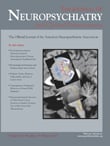Aripiprazole, Hypertension, and Confusion
To the Editor: Aripiprazole is a second-generation antipsychotic approved for schizophrenia and for the treatment of mania and mixed episodes associated with bipolar disorder. Aripiprazole has also been approved for the treatment of major depressive disorder in adults as an add-on therapy. Aripiprazole exhibits a high affinity for dopamine D2-D3 and serotonin 5-HT1A and 5-HT2A receptors and a moderate affinity for 5-HT2c, alpha1-adrenergic, histamine H1 receptors, and serotonin reuptake pump. It behaves as a partial agonist for D2 and 5-HT1A receptors and as an antagonist for 5-HT2A receptors. 1 In 2005, Borras et al. 2 reported a case of hypertensive crisis associated with the intake of aripiprazole. This phenomenon is quite infrequent and probably related to some individual factors. Here, we describe the case of an elderly depressed woman who developed delirium and a hypertension crisis after the intake of aripiprazole.
Case Report
Mrs. H. is an 80-year-old woman with a 15-year history of major depressive disorder without psychotic features. Previous antidepressant treatments included tricyclics, serotonin reuptake inhibitors, and serotonin-noradrenalin reuptake inhibitors. She also received augmentation strategies such as lithium, olanzapine, and dopaminergic agonists. Tolerance associated with all these therapeutics was always excellent. Unfortunately, she never achieved remission state. Ten years earlier, she underwent a coronary artery bypass graft surgery without any complications. She was treated for many years with low doses of aspirin, pravastatin, and bisoprolol for a moderate hypertension, and she was considered by cardiologists to be very well stabilized. She was treated with venlafaxine, 150 mg, without problems of hypertension related to the medication, and we decided to add aripiprazole, 5 mg, to potentiate the antidepressant effect of venlafaxine. About 48 hours after the first intake of aripiprazole, she became confused with symptoms such as loss of orientation, severe memory disturbances, and agitation. An arterial hypertension of 200/110 mmHg was measured, and the ECG was normal except for tachycardia (110 bpm). We decided to discontinue aripiprazole, and both hypertension and confusion resolved over 48 hours without treatment. The patient had never presented such symptomatology before. Over a period of 1 year, without addition of any new antihypertensive medication, and with venlafaxine treatment maintained during 4 months, the patient never experienced confusion again, and her blood pressure remained below 150/90 mmHg.
Discussion
Our report tends to support the association between aripiprazole and hypertension in a geriatric patient suffering from major depression, confirming the Letter to the Editor published by Borras et al. 2 In addition, the prescription of aripiprazole also induced mental confusion, probably related to acute hypertension. 3 In the present case report, aripiprazole induced hypertension could have been induced by the preexisting cardiovascular risk factors. Another hypothesis could involve association with venlafaxine, an antidepressant known for its ability to increase blood pressure. In conclusion, we can say that particular caution is needed in the geriatric population more prone to polypharmacy and comorbid physical illnesses.
1. McIntyre RS, Soczynska JK, Waldeyohannes HO, et al: Aripiprazole: pharmacology and evidence in bipolar disorder. Expert Opin Pharmacother 2007; 8:1001–1009Google Scholar
2. Borras L, Constant EL, Eytan A, et al: Hypertension and aripiprazole. Am J Psychiatry 2005; 162:2392Google Scholar
3. Ouimet S, Kavanagh BP, Gottfried SB, et al: Delirium is associated with a history of hypertension. Intensive Care Med 2007; 33:66–73Google Scholar



